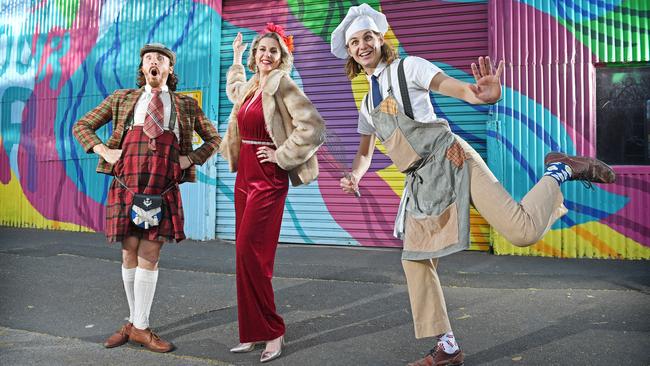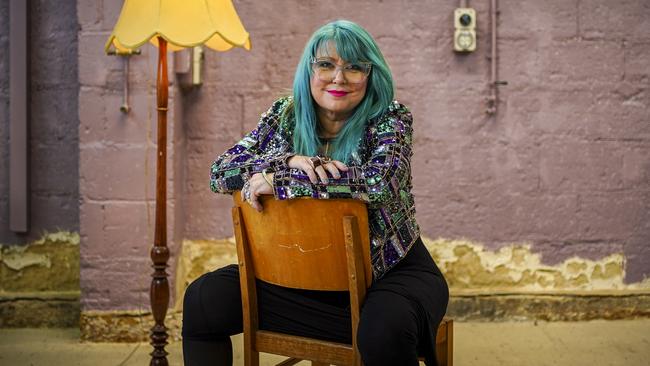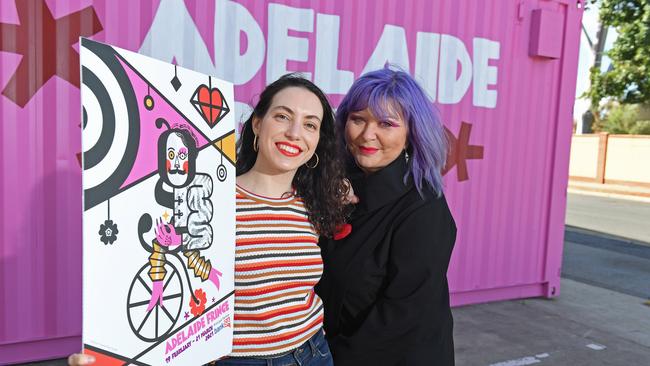How the 2021 Adelaide Fringe will help artists and the economy
From donating extra for empty seats to cancelling its usual late-night club, the Adelaide Fringe is making a raft of changes in 2021 to counter the effects of COVID-19.

Arts
Don't miss out on the headlines from Arts. Followed categories will be added to My News.
Radical measures have been introduced by next year’s Adelaide Fringe to bolster the number of artists, make shows more financially viable and continue to deliver economic benefits for the state’s hospitality industry.
Just over 300 acts had registered to take part in the 2021 Fringe by last week, compared to more than 1100 in recent years.
However, Fringe director Heather Croall is confident that number will more than double if registrations follow the usual pattern of flooding in just before the November 4 deadline for its printed program.
The usual Fringe Club will not take place, replaced by a campaign to encourage venues to stage their own late-night events, pay artists to perform at them and profit from admission fees and bar takings.
Audiences will now have options to help artists by also paying for an empty seat left for social distancing, or to buy a Watch From Home ticket if the event is streamed.
Applications for a total $500,000 worth of new $5000 and $10,000 grants for SA-based artists and shows, announced earlier this month, also had the cut-off date extended from October 21 until today/Monday.

Ms Croall said major Fringe hubs including the Garden of Unearthly Delights, Gluttony and RCC had indicated they would go ahead, but probably with fewer venues and reduced COVID-safe capacities at each site.
“Registrations always land the night before the deadline – that’s the way life is,” she said.
“We’ll be looking at mainly South Australian shows and that would probably be about 650 in a normal year, so I think we are tracking pretty well. We have got over 300 or so at the moment.”
This year’s Fringe generated a record $96.7m gross economic expenditure in the state, including $41.6m in visitor-related new money and 154,442 visitor bed nights.
Interstate and overseas artists had each accounted for “a couple of hundred” shows in recent years, Ms Croall said.
While few acts from overseas were likely to be able to attend the 2021 Fringe, interstate registrations are expected to increase if state border restrictions and quarantine requirements are lifted.
“That has a big impact on their budget. If you have to do hotel quarantine, that is going to put extra pressure on,” Ms Croall said.
“More NSW artists have been in touch with us since the announcement of their border opening. Things change quickly and announcements like that make a big difference.
“We still think we may get to 800 (shows).”
The Fringe will continue to accept rolling registrations for its online program after the print deadline, right up to and even during next year’s event from February 19 to March 21.
“It’s an interesting landscape – the Fringe isn’t just about the numbers,” Ms Croall said.
Up to half the shows registered in past years had been a “one-night music gig” or “unticketed exhibitions or workshops”.
“It’s more about what is the makeup of the program mix. About 650 or so would normally be South Australians.”
A total of more than $750,000 in grants were made available for artists and venues to take part in next year’s Fringe, compared with just $20,000 in 2015.
These include its annual $100,000 Artist Fund and $100,000 First Nations grant pools, and $54,000 in quick response grants made available this year from the James & Diana Ramsay Foundation.

More than 100 applications were expected for the new $5000 and $10,000 grants, of which about 70 will be successful depending on the amount awarded.
Venues are required to work on the assumption that the 50 per cent capacity put in place by SA Health will still apply during the Fringe.
Ms Croall said shows usually had to budget to cover their expenses, including wages and venue hire, through ticket sales.
“What we want to do is bolster those shows, lower the risk, with a bit of a grant. It doesn’t take away the fact that everyone still has to do a good budget and detailed planning for their season.”
The Fringe will introduce a number of other measures to help artists, venues, audiences and the wider hospitality industry.
“In 2021 we will be creating a ticket price called Double Your Applause. If anyone feels generous enough to buy the Double Your Applause ticket, it means that the artist is getting a sale for the empty seat next to you,” Ms Croall said.
Recent sold-out and extended seasons for theatre shows, cabaret performances and the Adelaide Film Festival showed that “the audience appetite is clearly there”.
“Things are selling out – I know it is 50 per cent capacity, but I’ve been speaking with people who at this time of year might normally only sell 30 per cent of their house,” Ms Croall said.
“Fifty per cent is a strong house. Across the board of Adelaide Fringe, on average every year we see about 42 per cent of the houses sold.
“The confidence to put on a Fringe show in 2021 is growing and we have had a lot more inquiries, even in the past week or so.”
Artists’ biggest concern was the possibility of another COVID shutdown during Fringe, Ms Croall said.
A pilot streaming program called Adelaide FringeVIEW was run during May and Watch From Home tickets will now be available for shows that choose to also stream next year.
“If there is a government enforced shutdown at any time during Fringe we are pushing everything towards the digital option,” Ms Croall said.
“We trying to lower the risk with these grants, we’re trying to lower the risk by offering Double Your Applause and also the Watch From Home tickets. We’re trying to put in place protection to avoid a full cancellation of seasons.
“Everything that we are doing is about trying to get more money out to artists to help them feel confident and secure that their Fringe season will be financially viable.”
